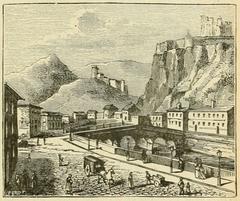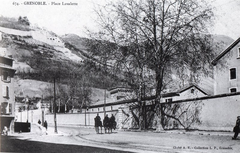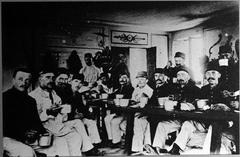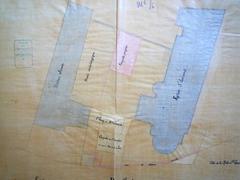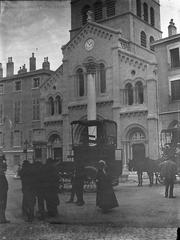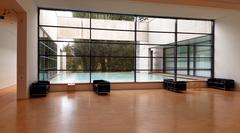Archives Municipales et Métropolitaines de Grenoble: Visiting Hours, Tickets, and Historical Information
Date: 03/07/2025
Introduction
Nestled in the heart of Grenoble, the Archives Municipales et Métropolitaines de Grenoble (AMMG) is an essential institution safeguarding the documentary heritage of both the city and its greater metropolitan area. Housing over eight linear kilometers of archival material, the AMMG chronicles Grenoble’s evolution from the Middle Ages to the present day. The archives are not only a resource for professional historians and genealogists but also a welcoming place for students, local residents, and travelers seeking to engage with the city’s rich past.
The AMMG is housed in the modern Bâtiment Édith Thomas, named after the esteemed historian and member of the French Resistance. This dedicated facility embodies Grenoble’s ongoing commitment to preserving and sharing its civic memory. With free admission, extensive digital resources, and accessible facilities, the archives invite everyone to explore centuries of history, from ancient manuscripts to contemporary records (mesinfos.fr; archives.grenoblealpesmetropole.fr).
Table of Contents
- Historical Overview
- Collections and Notable Holdings
- Planning Your Visit
- Digital Access and Online Resources
- Events, Exhibitions, and Educational Activities
- Nearby Attractions and Photography
- Visitor Tips and FAQ
- Contact Information
- Summary and Invitation
- References
Historical Overview
Origins and Early Development
The roots of the AMMG reach back to the 13th century, when Grenoble’s civic authorities began systematically preserving administrative documents. This tradition of record-keeping has resulted in a remarkable assemblage of materials, with the oldest documents in the collection dating from the medieval era. Over time, the archives expanded to reflect the city’s social, economic, and cultural transformation (mesinfos.fr).
The Jean-Berthoin Center and Modern Consolidation
Throughout the 20th and early 21st centuries, the Jean-Berthoin Center was the primary home for Grenoble’s municipal archives. As the collection grew, space and preservation needs prompted the relocation of certain records and ultimately led to the consolidation of municipal and metropolitan archives within the Bâtiment Édith Thomas. This move, completed after the Archives Départementales transferred to a new facility in 2021, has greatly improved both access and conservation conditions (mesinfos.fr).
Honoring Édith Thomas
In June 2022, the archives were dedicated to Édith Thomas, a pioneering historian, writer, and figure of the French Resistance. The naming of the building pays tribute to her contributions to historical scholarship and the preservation of civic memory (mesinfos.fr).
Collections and Notable Holdings
The AMMG’s holdings are vast and varied, including:
- Over 8 linear kilometers of documents (more than 50,000 boxes)
- Civil status registers (births, marriages, deaths) dating from 1543 to 1916
- Electoral rolls and censuses over 100 years old
- Historical maps, urban plans, and architectural drawings
- Over 100,000 photographs, 10,000 posters, and 5,000 plans
- Private archives and family papers
- Iconic medieval documents such as the “Livre de la Chaîne” from 1282, consular deliberations from 1492, and tax records from 1382
- Materials related to recent local events (e.g., the 2020 lockdown and 2023 Isère flood)
Many of these resources are accessible both on-site and online, providing invaluable insights into Grenoble’s civic, social, and architectural history (archives.grenoblealpesmetropole.fr; Wikipedia).
Planning Your Visit
Location and Getting There
The archives are located at 2 rue Auguste Prudhomme, 38000 Grenoble, within the Bâtiment Édith Thomas. The site is centrally positioned and well-served by public transport:
- Tram: Lines A or B to the “Archives” stop
- Bus: TAG lines 13 and 16, stops at Mutualité or St Roch
- Parking: Limited in the area; public transport is recommended for convenience
For detailed directions, consult the official website.
Opening Hours and Admission
- Monday to Wednesday: 1:00 PM – 5:00 PM
- Thursday and Friday: 9:00 AM – 12:30 PM
- Closed on weekends and public holidays
- Admission: Free; no ticket required
During special events (e.g., European Heritage Days), the archives often extend their hours and offer extra activities (journeesdupatrimoine.culture.gouv.fr).
Accessibility and Visitor Facilities
The AMMG is fully accessible for visitors with reduced mobility, featuring elevators, ramps, and adapted restrooms. The building is equipped with:
- A welcoming reception and assistance desk
- A reading room on the 4th floor with individual and group workspaces, digital terminals, and Wi-Fi
- Restrooms and a book/object exchange box (boîte à dons) on the ground floor
- Free public Wi-Fi
Archivists are available to guide you through collections and answer research questions (Le Tamis; Le Dauphiné).
Document Consultation and On-Site Research
- Who Can Visit: Open to all; no appointment needed for general access
- Registration: Required to consult original documents; bring valid photo ID
- Consultation: Original materials (manuscripts, registers, maps, photos) are available only in the reading room
- Rules: Only pencils and blank paper at desks; lockers for personal items; laptops/tablets allowed (silent mode); photography permitted without flash for personal use
- Copying Services: Digital or paper copies available by request (fees apply; allow ~15 days processing)
For more, see the practical information page.
Digital Access and Online Resources
A significant portion of the archives, including civil registers, photographs, maps, and thematic galleries, is digitized and accessible via the AMMG online portal. Researchers are encouraged to consult the online catalog before visiting, which can streamline on-site work and support remote research.
Events, Exhibitions, and Educational Activities
The AMMG regularly organizes:
- Temporary Exhibitions: Focused on Grenoble’s urban and social history, special anniversaries, and unique artifacts
- Guided Tours: Offered during events like the European Heritage Days and for pre-registered groups or schools
- Workshops and Educational Programs: For students, families, and researchers, including interactive games and research support
For event schedules, visit the events section or check their social media channels.
Nearby Attractions and Photography
Enhance your visit by exploring nearby sites:
- Musée de Grenoble: Renowned for its fine arts and archaeological collections
- Bastille Fortress: Historical fort with panoramic views of the city
- Place Grenette: Lively public square in the city center
The innovative architecture of the Bâtiment Édith Thomas and its surroundings also offer excellent opportunities for photography. Some exhibitions feature unique artifacts, such as a Lego model of Grenoble or gifts from international mayors (Le Dauphiné).
Visitor Tips and FAQ
- Plan Ahead: Consult the official website for updated hours, closures, and events.
- Prepare: Use the online catalog to identify desired materials and bring relevant reference numbers.
- Bring ID: Required for document consultation.
- Handle Materials Carefully: Follow staff instructions; gloves and supports provided when needed.
- Photography: Check policies with staff; personal use without flash is usually allowed.
- Group Visits: Contact the archives in advance for guided or educational sessions.
- Language: Most staff speak French; limited English-language support may be available.
Frequently Asked Questions
-
Do I need a ticket or appointment?
No, general admission is free and open during listed hours. Group visits or special events may require advance registration. -
Is the facility accessible?
Yes, the building is fully wheelchair accessible. -
Can I access archives online?
Many collections are digitized and available via the virtual inventory room. -
Are guided tours available?
Yes, especially during special events. For group tours, contact the archives in advance. -
Can I take photos?
Generally allowed in public areas and for documents, but always confirm with staff. -
Is there parking nearby?
Limited parking; public transport is recommended.
Contact Information
- Address: 2 rue Auguste Prudhomme, 38000 Grenoble, France
- Phone: +33 (0)4 76 76 34 22
- Email: [email protected]
- Website: https://archives.grenoblealpesmetropole.fr/
- Social Media: Facebook, Instagram, Twitter
Postal correspondence:
Le Forum, 3 rue Malakoff, 38000 Grenoble
Summary and Invitation
The Archives Municipales et Métropolitaines de Grenoble are a cornerstone of the city’s cultural life, offering free, open access to centuries of documentary heritage. Whether you are tracing family roots, undertaking research, or simply exploring Grenoble’s story, the AMMG provides expert support, engaging exhibitions, and a welcoming environment for all.
Extend your experience by using the Audiala app for guided tours and exclusive content, and stay updated on news and events through the archives’ website and social media. The AMMG warmly invites you to delve into the layers of Grenoble’s civic identity and discover its remarkable past (archives.grenoblealpesmetropole.fr; mesinfos.fr; journeesdupatrimoine.culture.gouv.fr).
References and Useful Links
- Visiting the Archives Municipales et Métropolitaines de Grenoble: History, Access, and Visitor Information, 2025, mesinfos.fr (mesinfos.fr)
- Visiting the Archives Municipales et Métropolitaines de Grenoble: Hours, Tickets, and Historical Insights, 2025, journeesdupatrimoine.culture.gouv.fr (journeesdupatrimoine.culture.gouv.fr)
- Your Guide to Visiting the Archives Municipales et Métropolitaines de Grenoble: Hours, Tickets & Visitor Information, 2025, archives.grenoblealpesmetropole.fr (archives.grenoblealpesmetropole.fr)

